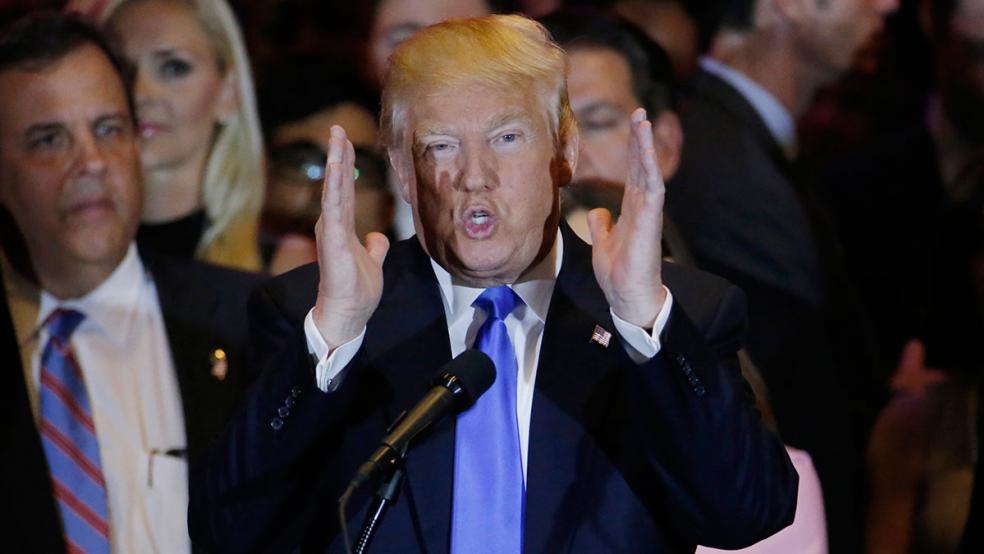His path to Republican presidential nomination all but assured, Donald Trump will soon enjoy one of the benefits of being a presumptive nominee for the Oval Office: meeting with U.S. intelligence officials for classified briefings on the nation's secrets.
Presidential standard-bearers have received classified intelligence briefings since 1952 when President Truman authorized the Central Intelligence Agency to share information with White House hopefuls Dwight Eisenhower and Adlai Stevenson.
Related: GOP Chief: This Isn’t Donald Trump’s Party
The idea behind the tradition was that the winner of the election wouldn’t be caught flat-footed about emerging and ongoing global threats the first day s/he walks into the Oval Office. Truman, who became commander-in-chief after the death of FDR, had no idea the Manhattan Project -- the effort that birthed the atomic bomb -- even existed.
The briefings traditionally start immediately after the party conventions, and while they may not contain top-secret sources, they could include some of the same information President Obama receives in what is known inside the Beltway as the President’s Daily Brief.
The prospect that Trump, known for his off-the-cuff, often random speaking style might receive even a glimpse of the country’s secrets has some people concerned that he will say something on the campaign trail about China or the anti-ISIS fight that was never supposed to be revealed. After all, this is a man who this week pointed to a National Enquirer story that claimed Ted Cruz’s father was somehow connected to JFK’s assassination.
Related: The Battle Between Donald Trump and Paul Ryan Was Inevitable
"It beggars the imagination," former CIA director Michael Hayden, who briefed Obama following the 2008 election, told The Washington Post. "Given that [Trump's] public persona seems to reflect a lack of understanding or care about global issues, how do you arrange these presentations to learn what are the true depths of his understanding?"
“My concern with Trump will be that he inadvertently leaks, because as he speaks extemporaneously, he’ll pull something out of his hat that he heard in a briefing and say it,” said a former senior U.S. intelligence official told The Daily Beast.
“It’s not an unreasonable concern that he’ll talk publicly about what’s supposed to stay in that room,” according to another former senior intelligence official.
Director of National Intelligence James Clapper told reporters last week that U.S. spy agencies have already begun planning briefings for Trump and his presumed Democratic rival, Hillary Clinton.
On Thursday, the White House couldn’t help but stoke the worries that Trump might be unfit to receive the closed-door updates while expressing confidence that Clinton was up to the challenge.
Related: From 'Hell No' to 'Tepid Yes,' Here’s Where Top Republicans Stand on Trump
“Yes, we do,” press secretary Josh Earnest told reporters during a briefing. “Secretary Clinton has obviously served this administration with distinction, and she’s got a lot of experience in understanding the need to protect classified information.”
His remarks come as Clinton herself is part of an FBI investigation into whether the “homebrew” email server she used as Secretary of State threatened national security.
Still, when it came to the former reality TV star, Earnest couldn’t help but play coy. “We'll have to see what decision the Director of National Intelligence makes. I guess I can't offer my own assessment,” he said.
The White House “will not be interfering in the decisions that are made by the intelligence community to provide information to the presidential candidates,” Earnest added.
Aki Pertiz*, a former CIA analyst who has contributed to the PDB, told The Post that Trump will undoubtedly present unique challenges to the intelligence professionals tasked with giving him the classified updates.
"He has all kinds of relationships with Chinese investors and Russian investors. He's spoken very highly of our adversaries. And he's talked about using torture and waterboarding and attacking people's families. All these things are going through the analysts' minds,” he said.
*Correction: This story initially attributed this quote to David Preiss. We regret the error.





